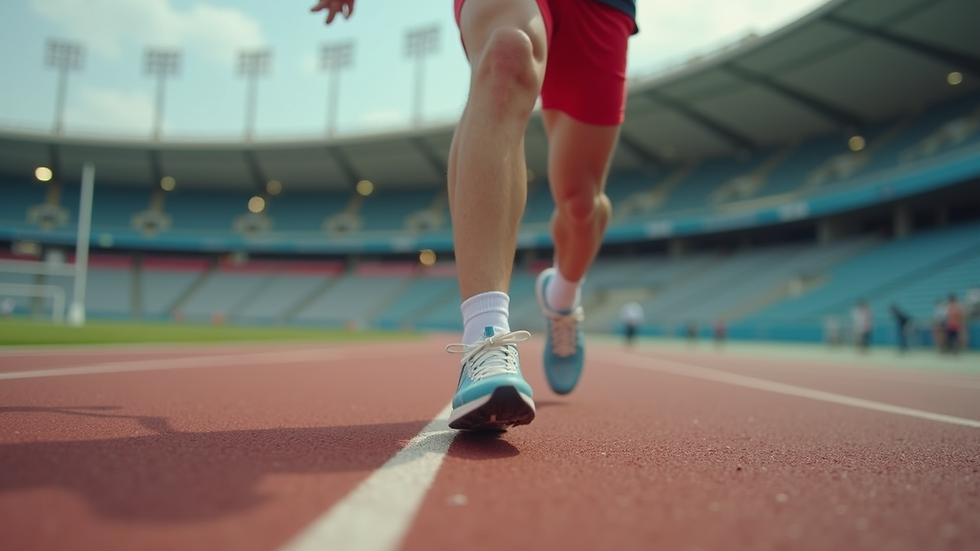Transform Your Paradigm: Coaching for Athletic Excellence
- Yves Latreille
- Aug 20
- 4 min read
In the world of sports, the difference between winning and losing often comes down to mindset. Athletes train their bodies rigorously, but what about their minds? This is where coaching plays a crucial role. Coaching is not just about teaching skills; it is about transforming paradigms. It is about helping athletes unlock their full potential.
In this post, we will explore how effective coaching can lead to athletic excellence. We will discuss the importance of mindset, the role of a coach, and practical strategies to enhance performance.
The Power of Mindset
Mindset is everything in sports. A positive mindset can propel an athlete to new heights, while a negative one can hold them back.
Fixed vs. Growth Mindset
Psychologist Carol Dweck introduced the concepts of fixed and growth mindsets.
Fixed Mindset: Believing that abilities are static and cannot be changed.
Growth Mindset: Understanding that abilities can be developed through hard work and dedication.
Athletes with a growth mindset are more likely to embrace challenges and learn from failures. They see setbacks as opportunities for growth.
Real-Life Example
Consider Michael Jordan, one of the greatest basketball players of all time. He was cut from his high school basketball team. Instead of giving up, he worked harder and developed his skills. His growth mindset allowed him to become a legend.
The Role of a Coach
A coach is more than just a trainer. They are mentors, motivators, and strategists.
Building Trust
Trust is the foundation of a successful coach-athlete relationship. Athletes need to feel safe and supported. A good coach listens and understands their athletes' needs.
Setting Goals
Coaches help athletes set realistic and achievable goals. These goals provide direction and motivation.
Short-term Goals: Focus on immediate improvements.
Long-term Goals: Aim for overall development and success.
Example of Goal Setting
A swimmer might set a short-term goal to improve their time in a specific event. Their long-term goal could be to qualify for the Olympics. A coach will help them create a plan to achieve both.
Practical Strategies for Coaching
Effective coaching involves various strategies that can enhance athletic performance. Here are some practical tips:
1. Visualization Techniques
Visualization is a powerful tool. Athletes can imagine themselves succeeding in their sport. This mental practice can improve focus and confidence.
2. Positive Reinforcement
Encouragement goes a long way. Coaches should celebrate small victories. This builds confidence and motivates athletes to keep pushing forward.
3. Constructive Feedback
Feedback should be specific and actionable. Instead of saying "You need to run faster," a coach might say, "Try to increase your stride length." This gives athletes clear guidance on how to improve.
4. Mindfulness Practices
Mindfulness can help athletes stay present and focused. Techniques like deep breathing or meditation can reduce anxiety and improve performance.
5. Team Building Activities
Team cohesion is essential in sports. Coaches can organize activities that promote teamwork and trust among athletes. This can lead to better communication and collaboration during competitions.
The Importance of Nutrition and Recovery
Athletic excellence is not just about training. Nutrition and recovery play vital roles in performance.
Nutrition
A balanced diet fuels the body. Coaches should educate athletes about proper nutrition.
Carbohydrates: Provide energy for training and competitions.
Proteins: Essential for muscle repair and growth.
Hydration: Staying hydrated is crucial for optimal performance.
Recovery
Recovery is just as important as training. Athletes need time to rest and heal.
Sleep: Quality sleep enhances performance and recovery.
Active Recovery: Light activities can help muscles recover without strain.
The Impact of Technology in Coaching
Technology has transformed the way coaches train athletes.
Performance Analysis Tools
Tools like video analysis can help coaches assess an athlete's performance. They can identify areas for improvement and track progress over time.
Wearable Technology
Devices that monitor heart rate, speed, and other metrics provide valuable data. Coaches can use this information to tailor training programs to individual athletes.
Inspiring Stories of Transformation
Many athletes have experienced significant transformations through effective coaching.
Example: Serena Williams
Serena Williams, a tennis icon, has had various coaches throughout her career. Each coach has contributed to her growth and success. Their guidance has helped her adapt her game and maintain her position at the top.
Example: Usain Bolt
Usain Bolt, the fastest man in the world, credits his coach for his success. His coach helped him develop a winning mindset and refine his technique. This partnership led to multiple world records and Olympic gold medals.
The Future of Coaching
As sports evolve, so does coaching. The future will likely see more emphasis on mental training and holistic approaches.
Embracing Diversity
Coaches will need to understand and embrace the diverse backgrounds of their athletes. This includes cultural differences and varying experiences.
Lifelong Learning
Coaches should commit to lifelong learning. Attending workshops, reading, and networking with other professionals can enhance their skills.
Final Thoughts
Transforming paradigms through coaching is essential for athletic excellence. A strong mindset, effective coaching strategies, and a focus on nutrition and recovery can lead to remarkable achievements.
Athletes who embrace these principles can unlock their full potential. With the right guidance, they can overcome obstacles and reach new heights.
As you embark on your journey in sports, remember that coaching is not just about skills. It is about transforming your mindset and believing in your ability to succeed.

Embrace the journey, trust the process, and watch as you transform your paradigm for athletic excellence.



Comments